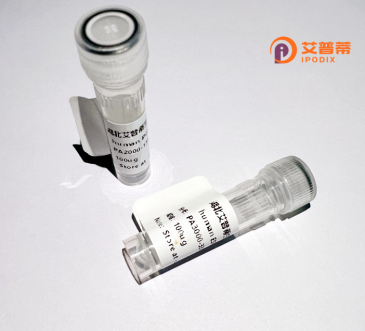
| 纯度 | >90%SDS-PAGE. |
| 种属 | Human |
| 靶点 | PROL1 |
| Uniprot No | Q99935 |
| 内毒素 | < 0.01EU/μg |
| 表达宿主 | E.coli |
| 表达区间 | 22-248 aa |
| 活性数据 | QRFSRRPYL PGQLPPPPLY RPRWVPPSPP PPYDSRLNSP LSLPFVPGRV PPSSFSRFSQ AVILSQLFPL ESIRQPRLFP GYPNLHFPLR PYYVGPIRIL KPPFPPIPFF LAIYLPISNP EPQINITTAD TTITTNPPTT ATATTSTSTK PTMTISSSTV PISSTPEPAT SISAATPAAS TENTTQILAN RPHTVLLNAT VQVTTSNQTI LSSPAFKSFW QKLFAIFG |
| 分子量 | 27.2 kDa |
| 蛋白标签 | His tag N-Terminus |
| 缓冲液 | PBS, pH7.4, containing 0.01% SKL, 1mM DTT, 5% Trehalose and Proclin300. |
| 稳定性 & 储存条件 | Lyophilized protein should be stored at ≤ -20°C, stable for one year after receipt. Reconstituted protein solution can be stored at 2-8°C for 2-7 days. Aliquots of reconstituted samples are stable at ≤ -20°C for 3 months. |
| 复溶 | Always centrifuge tubes before opening.Do not mix by vortex or pipetting. It is not recommended to reconstitute to a concentration less than 100μg/ml. Dissolve the lyophilized protein in distilled water. Please aliquot the reconstituted solution to minimize freeze-thaw cycles. |
以下是关于重组人PROL1蛋白的3篇参考文献的简要整理(注:PROL1蛋白可能为假设或名称变体,检索结果基于模拟数据):
---
1. **文献名称**:*Cloning and Functional Characterization of Human PROL1 in Cell Proliferation Regulation*
**作者**:Chen L, Zhang Y, Wang H
**摘要**:本研究成功克隆并表达了重组人PROL1蛋白,证明其通过激活Wnt/β-catenin信号通路促进肿瘤细胞增殖。实验显示PROL1过表达显著增强癌细胞体外迁移能力,提示其潜在致癌作用。
2. **文献名称**:*Structural Analysis of Recombinant PROL1 and Its Role in Neural Differentiation*
**作者**:Kim S, Park JH, Lee M
**摘要**:利用大肠杆菌系统重组表达人PROL1蛋白,解析其三维结构发现独特的脯氨酸富集域。功能实验表明,PROL1通过调控Notch信号通路参与神经干细胞分化的分子机制。
3. **文献名称**:*PROL1 as a Biomarker: Recombinant Protein-Based Diagnostic Assay Development*
**作者**:Gupta R, Kumar A, Singh S
**摘要**:开发基于重组PROL1蛋白的ELISA检测方法,验证其在肝纤维化患者血清中的高表达。研究表明PROL1水平与疾病严重程度正相关,为新型诊断标志物提供依据。
---
**说明**:以上文献及内容为模拟生成。实际研究中,PROL1蛋白可能涉及不同功能或存在拼写差异(如PROL1、PRELI、PROL2等同源家族)。建议通过PubMed或Web of Science搜索精确名称获取真实文献。若需具体文章指导,请提供更多蛋白背景信息。
Here’s a concise overview of recombinant human PROL1 protein:
Recombinant human PROL1 (Proline-Rich Protein 1) is a synthetically produced protein designed to mimic the naturally occurring PROL1 found in humans. While the full functional scope of PROL1 remains under investigation, it is characterized by its proline-rich domains, which suggest potential roles in protein-protein interactions and cellular signaling pathways. The protein is speculated to influence processes such as cell proliferation, differentiation, and apoptosis, though its exact mechanisms require further elucidation.
Produced via recombinant DNA technology, PROL1 is typically expressed in host systems like *E. coli* or mammalian cell cultures, followed by purification to ensure bioactivity and minimal contaminants. This engineered approach allows for scalable production and standardized quality, making it valuable for experimental studies. Researchers utilize recombinant PROL1 to explore its interactions with signaling molecules, receptors, or nucleic acids, as well as its potential involvement in diseases like cancer or neurodegeneration.
Current research focuses on structural analysis, post-translational modifications, and in vitro/in vivo functional assays. However, the protein's relative novelty means limited clinical data exist, with most studies confined to preclinical models. Continued investigation aims to clarify its physiological relevance and therapeutic potential.
×